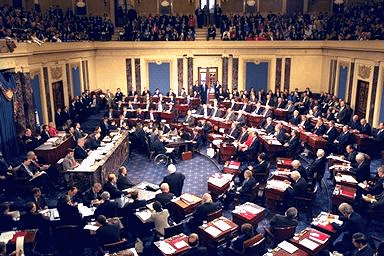
The word "impeachment" derives from Latin roots expressing the idea of becoming caught or entrapped, and has analogues in the modern French
verb empêcher (to prevent) and the modern English
impede.
1804 The Democratic-Republican-controlled United States Senate begins an impeachment trial against Federalist-partisan Supreme Court of the United States Justice Samuel Chase.
1805 Justice Samuel Chase is acquitted at the end of his impeachment trial by the U.S. Senate.
1868 Andrew Johnson becomes the first President of the United States to be impeached by the United States House of Representatives. He is later acquitted in the Senate.
1868 A court of impeachment is organized in the United States Senate to hear charges against President Andrew Johnson.
1868 President Andrew Johnson is acquitted in his impeachment trial by one vote in the United States Senate.
1868 The impeachment trial of U.S. President Andrew Johnson ends with Johnson being found not guilty by one vote.
1871 In North Carolina, William Woods Holden becomes the first governor of a U.S. state to be removed from office by impeachment.
1974 Watergate Scandal: The United States House of Representatives Judiciary Committee opens formal and public impeachment hearings against President Richard Nixon.
1974 Watergate Scandal: the House of Representatives Judiciary Committee votes 27 to 11 to recommend the first article of impeachment (for obstruction of justice) against President Richard Nixon.
1988 Governor Evan Mecham of Arizona is convicted in his impeachment trial and removed from office.

